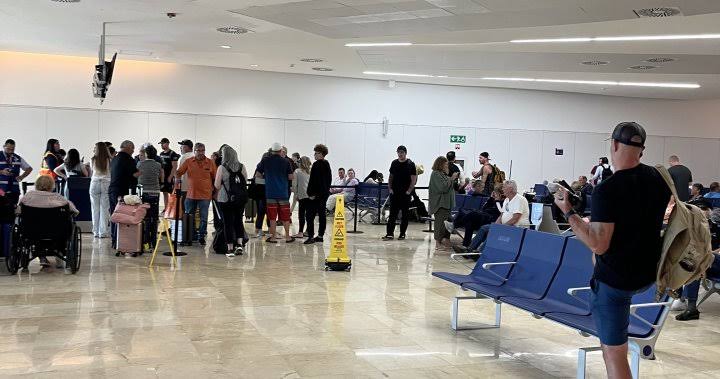“Tragedy in the Skies: WestJet Grounds All Flights Until May After Catastrophic Incident Claims 100 Lives”
In a devastating turn of events that has sent shockwaves through the global aviation industry, Canadian airline WestJet has announced the immediate suspension of all flights until the end of May following a tragic aviation disaster that claimed the lives of 100 passengers. The decision follows what is being described as one of the most catastrophic incidents in the airline’s history, prompting widespread mourning and raising urgent questions about airline safety protocols.
The Tragic Incident
The disaster occurred on the evening of April 27, when WestJet Flight WS378 departed from Vancouver International Airport en route to Toronto. Midway through the flight, the aircraft reportedly experienced severe mechanical failure, leading to a rapid loss of altitude and communication with air traffic control. Witnesses on the ground and nearby aircraft reported seeing flames erupt from one of the engines shortly before the plane vanished from radar.
Despite frantic efforts from search and rescue teams, wreckage was found scattered in a remote area of Alberta. Emergency crews confirmed that none of the 92 passengers and 8 crew members survived the crash. Authorities have since been working tirelessly to identify the remains and notify the families of those lost.
Official Response
In an emergency press conference held the following day, WestJet CEO Alexis Morgan expressed deep sorrow and announced the airline’s decision to suspend all operations until a full investigation is completed.
“We are devastated by this unimaginable loss,” Morgan said. “Our hearts are with the families of the passengers and crew members. We are cooperating fully with the Transportation Safety Board of Canada and other international aviation bodies to understand how this tragedy occurred. Until we can ensure the complete safety of our fleet, we will not be operating any further flights.”
The airline, which operates hundreds of flights daily across Canada, the United States, and Europe, has never before grounded its entire fleet. The move, though rare, has been widely applauded by safety experts as a responsible and transparent step.
Global Repercussions
The incident has reverberated across the global aviation industry, with several international airlines temporarily suspending codeshare agreements with WestJet. Canada’s Transport Minister, Louise Bertrand, has pledged a full government-led inquiry into the matter, stating that “every possible measure will be taken to ensure this never happens again.”
Preliminary findings from the Transportation Safety Board suggest the plane involved—an aging Boeing 737—may have suffered a catastrophic engine failure, possibly linked to a fault in the aircraft’s maintenance procedures or aging components. Investigators are also examining the plane’s black box and cockpit voice recorder, which were recovered from the crash site under difficult conditions.
Eyewitness Accounts and Passenger Stories
Families and friends of those on board have been sharing their grief and memories publicly. Among the passengers were a newlywed couple on their honeymoon, a group of university students returning from a conference, and several business travelers.
Catherine Levesque, whose brother was aboard the ill-fated flight, described the last text she received from him: “He said he was excited to come home after a long week. I never imagined that would be the last message I’d get.”
Social media has since been flooded with tributes, condolences, and calls for accountability. A candlelight vigil was held in Calgary, where WestJet is headquartered, attended by thousands of mourners, airline employees, and political leaders.
Impact on the Airline
WestJet, founded in 1996, has long been considered a trusted carrier in Canada, with a reputation for budget-friendly fares and strong customer service. However, the airline has faced financial difficulties in recent years due to rising fuel costs, staffing shortages, and increased competition from ultra-low-cost carriers.
This tragedy now casts a long shadow over the airline’s future. Stock prices for its parent company, Onex Corporation, plummeted by nearly 15% in early trading following the announcement of the suspension. Analysts warn that the financial and reputational damage from this incident could take years to recover from.
In an internal memo to staff, WestJet leadership acknowledged the emotional toll of the incident and offered psychological support services to employees, many of whom have described the past days as “traumatizing.”
Safety and Accountability
Aviation safety advocates have already begun calling for stricter oversight of aircraft maintenance, particularly for older planes still in operation. The Boeing 737 model involved in the crash was over 20 years old, though it had passed standard maintenance inspections. Still, the crash has raised renewed concerns about aging fleets in commercial aviation and the adequacy of current safety checks.
“This is a wake-up call,” said aviation analyst Jason Munroe. “We need to look closely at not just how planes are maintained, but how airlines balance cost-cutting with passenger safety.”
The crash has also reignited debate over whether regulators have become too lenient with large carriers, especially in the aftermath of the pandemic, when many oversight agencies faced budget cuts and staffing shortages.
What Happens Next?
In the coming weeks, WestJet will face mounting pressure—from regulators, grieving families, and the public—to provide answers. The airline has already pledged full cooperation with authorities and launched an internal safety audit, but questions remain as to how such a catastrophic failure could have occurred without prior warning.
The Transportation Safety Board is expected to release a preliminary report within 30 days, though a final report could take months. Meanwhile, lawsuits from the families of victims are anticipated, which could open further inquiries into WestJet’s safety practices and corporate governance.
The government has promised a full compensation package for affected families and has also set up a national support hotline for those grieving the loss of loved ones.
Conclusion
This tragedy has become a defining moment not just for WestJet, but for the entire aviation industry in Canada. As investigators piece together the final moments of Flight WS378, the world waits for answers. But for the families of the 100 lives lost, the grief is permanent—and the memories of their loved ones will forever echo in the skies.






